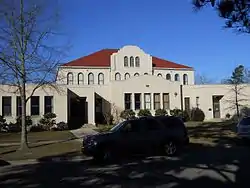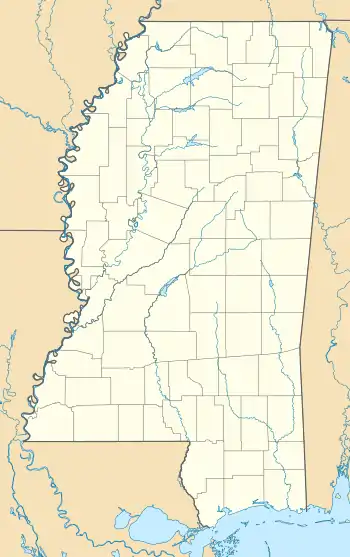Walthall School (Hattiesburg, Mississippi)
Walthall School, also known as Court Street School, is located at 601 Court Street in Hattiesburg, Mississippi. It was utilized as a public school building from 1902 until 1987.[2] The building is a contributing property to the Hattiesburg Historic Neighborhood District, which was placed on the National Register of Historic Places in 1980.[3] The building was designated a Mississippi Landmark in 1988.[1]
Walthall School | |
 Main facade in 2013 | |
  | |
| Location | 601 (603) Court Street, Hattiesburg, Mississippi[1] |
|---|---|
| Coordinates | 31.31878°N 89.28808°W |
| Built | 1902[2] |
| Architect | Robert E. Lee |
| Architectural style | Mission Revival as of 1928[2] |
| Part of | Hattiesburg Historic Neighborhood District (element 205) (ID80002236[3]) |
| USMS No. | 035-HAT-0705-NRD-ML |
| Significant dates | |
| Designated CP | September 17, 1980 |
| Designated USMS | May 6, 1988[1] |
Description
.jpg.webp)
Walthall School was constructed as a two-story brick building with a 12-bay front facade that contained round-arch windows. The building has a hipped roof, with a Mission style effect achieved by a curvilinear gable. It has one-story flat-roof additions. Stucco was applied to the outer brick walls as a Works Progress Administration project (between 1935 and 1943).[3]
History
Shortly after the turn of the 20th century, the Hattiesburg School Board engaged the services of architect Robert E. Lee to design the Court Street school building.[4][note 1]
The school was named for Edward Cary Walthall, a general in the Confederate States Army during the American Civil War and a United States senator from Mississippi (1885–1894).[5]
In 1928, the building was expanded and remodeled to reflect a Mission Revival architectural style, under the direction of architect Noah Webster Overstreet.[6] The school was again enlarged by additions made in 1941, by architects Landry & Matthes, and in 1957, by Associated School Architects.[4]
Use of the structure as a public school ended in 1987.[2] In 1995, the Hattiesburg Public School District sold the building and grounds to the Hattiesburg Historic Neighborhood Association.[7] The Association then created the Walthall Foundation to own and operate the building.
In 2006, the Walthall Foundation sold the building to a development company for establishment of condominiums within the structure, while retaining the building's Mississippi Landmark status, as well as its status on the National Register of Historic Places.[7]
Notes
- Lee also designed Hattiesburg's Eaton Elementary School and the Old Hattiesburg High School, both individually listed on the National Register, per ("National Register Information System". National Register of Historic Places. National Park Service. July 9, 2010. )
References
- "Mississippi Landmarks (Forrest County)". Mississippi Department of Archives and History. Retrieved 2017-04-29.
- "Walthall School (Court Street School)". Historic Resources Inventory Fact Sheet. Mississippi Department of Archives and History. Retrieved 2017-04-29.
- Jody Cook (July 7, 1980). "National Register of Historic Places Registration: Hattiesburg Historic Neighborhood District". National Park Service. Retrieved April 29, 2017. With 21 photos from 1980.
- Thomas Rosell (January 17, 2013). "Architectural Twins? Eaton and Walthall Schools, Hattiesburg". Preservation in Mississippi. Retrieved April 29, 2017.
- "Hattiesburg Public Schools" (PDF). Hattiesburg Area Historical Society. Winter 2015. Retrieved April 29, 2017.
- "Artisan Profile – Overstreet, Noah Webster (b.1888 - d.1973)". Mississippi Department of Archives and History. Retrieved April 29, 2017.
- "Hattiesburg Historic Neighborhood Association – Neighborhood History". Hattiesburg Historic Neighborhood Association. Retrieved April 29, 2017.